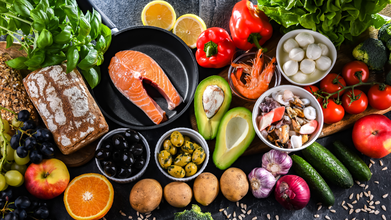- Health Conditions A-Z
- Health & Wellness
- Nutrition
- Fitness
- Health News
- Ayurveda
- Videos
- Medicine A-Z
- Parenting
Could This ‘Brain Fuel’ Diet Help Treat Bipolar Disorder? New Brain Study Says Yes!

A revolutionary study published in BJPsych Open has revealed compelling evidence that a ketogenic diet can have a major impact on mental and physical well-being in bipolar disorder patients. The study, conducted by Dr. Iain Campbell, PhD, Baszucki Metabolic Psychiatry Research Fellow at the University of Edinburgh, investigates how a metabolic-based intervention might represent an exciting new strategy for treating this serious mental illness.
The research is the first in Europe to use neuroimaging methods, namely magnetic resonance spectroscopy (MRS), to investigate changes in brain metabolism in people with bipolar disorder after a ketogenic diet. The imaging findings revealed decreases in excitatory neurotransmitters, which are normally increased in bipolar disorder. This indicates that the ketogenic diet can stabilize brain activity, possibly reducing mood swings and other symptoms of the condition.
The trial involved 27 participants diagnosed with bipolar disorder, 20 of whom successfully completed the 6-8 week program. A staggering 91% of these individuals maintained ketosis, the metabolic state where the body primarily burns fat for energy instead of carbohydrates. Those who provided consistent daily ketone and mental health assessments reported notable improvements in mood, energy levels, anxiety, and impulsivity.
Dr. Campbell, who personally adheres to a ketogenic diet himself in order to treat symptoms of bipolar disorder, discussed the importance of these results:
"We saw indicators of diminished excitotoxicity in the brain regions most implicated in bipolar disorder. These findings are consistent with the metabolic overdrive hypothesis that postulates energy dysregulation within the brain as central to the disorder. Treating the dysregulation by means of a ketogenic diet could be a game-changer in treatment-resistant patients.
Aside from the scientific evidence, personal accounts of study participants underscore the life-altering effect of a ketogenic diet.
"Quite literally, for the first time in years, I felt like my brain was finally fueled correctly," explained a participant.
Another participant called the diet "a lifeline, restoring my energy and sense of hope. I felt like I was finally healing my mind, not just coping with my bipolar symptoms."
One of the very vivid accounts described the impact of ketosis in terms of a relaxing mental atmosphere:
"Applying a ketogenic diet is akin to giving my mind a nice warm bath. The edginess disappears. I am more calm, more clear, and my brain function is restored again."
Aside from the psychological benefits of the study, the ketogenic diet was also seen to have beneficial effects on participants' physical health. Nineteen out of the 20 trial completers lost a total of 9.3 pounds (4.2 kg) on average and showed improvements in body mass index (BMI) and blood pressure.
These results are noteworthy in that numerous treatments for bipolar disorder, such as mood stabilizers and antipsychotic medications, have been linked to metabolic side effects of weight gain and risk of cardiovascular disease. In contributing to the reduction of such risks, a ketogenic diet may provide a double dividend for patients with bipolar disorder.
Link Between Metabolism and Bipolar Disorder
Although the ketogenic diet has previously been known largely for its utility in treating epilepsy that is treatment-resistant, it is a somewhat new area to explore in conditions of psychiatry such as in bipolar disorder. It has come to be known that metabolic imbalance is an underlying factor in causing psychiatric disorders as energy production deficiencies have been recognized to contribute towards neural excitability and mood disruption.
One of the important findings of the study is that people with bipolar disorder tend to have sodium levels higher than usual within their cells. Lithium, a standard mood stabilizer, acts partly by reducing these sodium levels. The ketogenic diet seems to do the same thing, offering a metabolic explanation for its beneficial effect on mood stabilization.
What Is a Ketogenic Diet?
The ketogenic diet is a high-fat, low-carb diet that changes the body's main source of energy from glucose to ketones. As carbohydrate consumption is significantly decreased, the liver breaks down fats into ketones, which can be used as a substitute fuel by the brain and body.
First developed in the 1920s as a therapy for epilepsy, the ketogenic diet has been researched for its therapeutic applications in a variety of neurological and psychiatric disorders, including Alzheimer's disease, Parkinson's disease, and most recently, bipolar disorder.
There's a critical need for bigger replication studies and well-designed randomized clinical trials to follow up on these findings," added Dr. Campbell. "Our findings indicate that a ketogenic diet may be a useful adjunctive treatment for bipolar disorder, bringing new promise to patients who have difficulty with standard therapies.
Mediterranean Diet Can Protect Against Adult-Onset Asthma, Study Finds

Credit: Canva
Asthma is usually associated with children. However, a large number of adults are diagnosed with asthma later in life, known as adult, onset asthma. A sharp contrast to childhood asthma, adult cases can be more long, lasting, difficult to control and very much influenced by environmental and lifestyle factors.
Smoking, air pollution, and workplaces are three known risk factors, but experts in the field are opening up the research to include diet as a possible factor that can be changed. New research indicates our diets may play a big role in asthma development and following a Mediterranean diet may significantly lower overall risk by nearly 50 percent.
The World Health Organization estimates that over 260 million individuals globally suffer from asthma.
What Is the Mediterranean Diet?
The Mediterranean diet is inspired by traditional eating patterns in countries bordering the Mediterranean Sea, particularly in places like Spain, Greece and Italy. It recommends eating:
- Fruits and vegetables
- Whole grains
- Legumes and nuts
- Olive oil as the primary fat source
- Moderate fish consumption
- Limited red and processed meats
This diet is well known for its cardiovascular benefits and its strong anti-inflammatory and antioxidant properties have prompted scientists to explore its impact on respiratory health.
The Study That Sparked Attention
A large, scale prospective study through the Seguimiento Universidad de Navarra (SUN) Project aimed at finding out if a Mediterranean diet could lower asthma in adults. The project, done by the team at Universidad de Navarra, included data from more than 17,000 university graduates who were tracked for almost 13 years in Spain.
The study participants did not have asthma at the time of registration. Their food intake was assessed through a validated Mediterranean Diet Score (scale of 0 to 9), and incidences of asthma were recorded with the help of follow, up questionnaires.
The study showed that people sticking to the Mediterranean diet the most became adults with asthma 42 percent less than those who followed the diet the least. Additionally, after changing for confounders like age, smoking, physical activity and BMI, this protective effect was still significant from the statistical viewpoint.
The study results were covered by EMJ Reviews and appeared among respiratory research publications, thus attracting the attention of the makers of the next major public health policy measure.
Why Does Diet Affect Asthma?
Essentially, asthma is an inflammatory disease as chronic inflammation of the airways causes the narrowness of the bronchi which results in symptoms. The Mediterranean diet is rich in:- Omega-3 fatty acids from fish, which help regulate inflammatory pathways
- Polyphenols and antioxidants from fruits and vegetables, which reduce oxidative stress
- Healthy monounsaturated fats from olive oil, which may support immune balance
What To Remember
The results are promising but one should keep in mind that this was an observational study. This means that the researchers found associations but not direct cause, and, effect relationships. Diet was self, reported, and although the researchers made adjustments for various confounding factors, there is always a possibility of residual bias.Some previous cohort studies have yielded inconsistent results, and experts concur that randomized controlled trials would produce more reliable evidence.
The Bigger Picture
Despite the different restrictions, the investigation still contributes to the increasing volume of literature indicating that diets affect not only cardiac health or body weight but could have impacts on lung health as well. Since diet is a changeable element by an individual, encouraging Mediterranean, type eating habits might be considered among the comprehensive approaches for forestalling chronic inflammatory diseases, such as asthma.Though additional research is necessary to be sure, the main idea is increasingly conspicuous: our diet today might determine our respiratory health over the next several years.
FSSAI Reveals Key Tips To Keep Your Kitchen Healthy – How To Spot High Quality Vegetables?

(Credit - Canva)
FSSAI (Food Safety and Standards Authority of India) has recently shared how one can spot ‘vegetables gone wrong’ before you bring them to your home.
When it comes to health, eating right plays a huge role, and that starts with bringing the right ingredients home. Even though fruits and vegetables are healthy, spotting the signs of spoiled items can be difficult. You could easily bring home bacteria and even dangerous germs like Salmonella, E. coli, and Listeria, according to the US Food Safety department.
Food safety is simple if you keep these key things in mind, according to FSSAI.
How To Buy Fresh Fruits & Vegetables?
Start with the "touch test"
Always choose fruits that are firm and solid. If you feel soft spots, it usually means the fruit is starting to rot or was bruised during transport, which invites bacteria. Check the skin for deep cracks or holes, as these are open doors for pests.
For citrus fruits like lemons and oranges, weight is the best secret. If it feels heavy for its size, it is full of juice; if it feels light and "puffy," it is likely dry inside. Finally, don't worry about green spots on the skin; they are often just natural color marks and don't change the sweet taste inside.
How To Spot Good Root And Tuber Vegetables?
Vegetables that grow underground, like carrots, beets, turnips, and sweet potatoes, should feel as strong as the earth they came from. When you pick them up, they should feel heavy and very firm to the touch.
If a carrot feels "bendy" or rubbery like a piece of plastic, it has lost its internal moisture and will be tough and tasteless rather than crunchy.
While it is tempting to grab the biggest vegetable in the pile, the "size secret" is that smaller roots are actually better. Smaller ones are usually younger, which makes them naturally sweeter, more tender, and less "woody" or fibrous when you cook them.
Can You Spot Good Grapes?
Grapes are very delicate because they stop ripening the moment they are clipped from the vine. To find the freshest bunch, use the "attachment rule": give the bunch a very gentle shake.
The grapes should stay firmly attached to their stems. If they fall off easily, it is a sign the fruit is old and losing its flavor. Next, look closely at the "skeleton" or the stems of the bunch.
You want to see stems that are green and flexible, which proves they were harvested recently. If the stems look brown, dry, or brittle, the grapes will likely be sour, mushy, or lacking that fresh pop.
How To Spot High Quality Onions?
Since onions are the base for almost every meal, picking a bad one can ruin your entire dinner. A high-quality onion should feel heavy and rock-solid all the way around, especially near the "neck" at the top.
When you give it a gentle squeeze, it should not give way or feel "hollow." If an onion feels soft or squishy, it is likely rotting on the inside where you can’t see it. Also, check for any green sprouts growing out of the top.
Sprouting means the onion is aging and using up its energy, which makes the layers inside lose their crispness and punchy flavor.
This At-Home Test Reveals Whether Your Jaggery Is Adulterated

Credit: TOI
Jaggery or, also commonly known as Gurr, is considered the best alternative to white sugar however, more than often, headlines such as "adulterated jaggery has been seized" dominates our daily new.
Despite its popularity and varying uses, it is one of the most commonly adulterated foods mixed with components like baking soda, washing soda or chalk powder. But now the food Safety and Standards Authority of India (FSSAI) shares how we can do a test at home to determine jaggery adulteration with baking soda.
How To Do A Home Test?
The home test can help you find out if your jaggery has been altered with baking soda. Follow the steps below:1. Take one 1/4th of a teaspoon of crushed jaggery in a glass container or test tube.
2. Now, add 3 ml of HCL acid, also known as hydrochloric acid, in a container or test tube.
3. If you see bubbles are formed, your jaggery
According to the agency, sodium bicarbonate (baking soda) reacts with acid in the natural sweetener and releases carbon dioxide in the form of bubbles.
FSSAI advises that while home tests can help identify basic forms of adulteration, they are not a substitute for laboratory testing. Only certified labs can conclusively determine the purity of jaggery and detect multiple adulterants at once.
What Are The Side Effects Of Consuming Adulterated Jaggery?
There are many side effects of consuming adulterated jaggery, as components such as baking soda or washing powder are highly alkaline. They may not affect one-time consumption, which can cause short-term health risks, such as:1. Chemical burns in the mouth, throat, and stomach lining.
2. Severe acidity
3. Vomiting
Long-term health risks may involve:
1. Organ failure: Chronic ingestion of industrial dyes and soda puts extreme oxidative stress on the liver and kidneys, which are responsible for filtering these toxins. This can lead to permanent scarring (fibrosis).
2. Hormonal imbalance: Reports from the FDA in 2025 noted that jaggery packaged in low-grade heated plastic releases phthalates and dioxins, which act as endocrine disruptors, affecting reproductive health.
3. Hidden sugar spike: Since white sugar is a common adulterant, individuals with diabetes who consume jaggery as a "safe" alternative may experience life-threatening spikes in blood glucose levels.
© 2024 Bennett, Coleman & Company Limited

